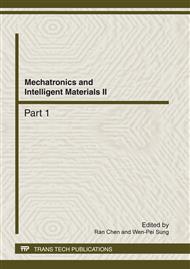[1]
George Xylomenos, Konstantinos Katsaros, Vasilis Tsakanikas, Support of multiple content variants in the multimedia broadcast/multicast service, International Journal of Communication Systems. 24 (2011) 691–708.
DOI: 10.1002/dac.1175
Google Scholar
[2]
J. Ilow, Forecasting network traffic using FARIMA models with heavy tailed innovations, Proceedings of ICASSP. 6 (2000) 3814-3817.
DOI: 10.1109/icassp.2000.860234
Google Scholar
[3]
Gang Tong, Chunling Fan, et al, Fuzzy Neural Network Model Applied in the Traffic Flow Prediction, IEEE International Conference on Information Acquisition. (2006) 1229–1233.
DOI: 10.1109/icia.2006.305923
Google Scholar
[4]
WANG H J, SHEN L, LIU H Y, Adjustments based on wavelet transform ARIMA model for network traffic prediction. Proceedings of International Conference on Computer Engineering and Technology. (2010) 520–523.
DOI: 10.1109/iccet.2010.5485432
Google Scholar
[5]
Zhihui, Z., Yunlian, S., Yu, J., Short term Load Forecasting Based on EMD and SVM, High Voltage Engineering. 33 (2007) 118-122.
Google Scholar
[6]
HUANG N E, SHEN Z, LONG S R, The empirical mode decomposition and the hilbert spectrum for nonlinear and non-stationary time series analysis, Proc Royal Soc London A. (1998) 903-995.
DOI: 10.1098/rspa.1998.0193
Google Scholar
[7]
R. K. NIAZY, C. F. BECKMANN, et al, Performance evaluation of ensemble empirical mode decomposition, Advances in Adaptive Data Analysis. 1 (2009) 231–242.
DOI: 10.1142/s1793536909000102
Google Scholar
[8]
WU Z H, HUANG N E, Ensemble empirical mode decomposition: a noise-assisted data analysis method, Advances in Adaptive Data Analysis. 1 (2009) 1–41.
DOI: 10.1142/s1793536909000047
Google Scholar


